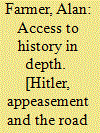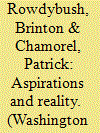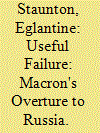|
|
|
Sort Order |
|
|
|
Items / Page
|
|
|
|
|
|
|
| Srl | Item |
| 1 |
ID:
000714


|
|
|
|
|
| Publication |
London, Hodder and Stoughton, 1999.
|
| Description |
119p.Pbk
|
| Standard Number |
0340746971
|
|
|
|
|
|
|
|
|
|
|
|
Copies: C:1/I:0,R:0,Q:0
Circulation
| Accession# | Call# | Current Location | Status | Policy | Location |
| 042130 | 940.540943/DAR 042130 | Main | On Shelf | General | |
|
|
|
|
| 2 |
ID:
112169


|
|
|
| 3 |
ID:
084419


|
|
|
|
|
| Publication |
2008.
|
| Summary/Abstract |
In the 17th century there was no professional diplomacy: a mission as envoy or ambassador was part of a broader political or administrative career. Many politicians still neglected the importance of permanent diplomacy. Thus, there was no training, and few ambassadors had solid experience in foreign traditions and languages or in methods of diplomatic negotiations. It was rather accidental when a man from a well established Parisian family, like Claude de Mesmes, Count d'Avaux (1595-1650), served France abroad for more than 20 years. At the climax of his career, at the Congress of Westphalia, he was in many ways what we today think a good diplomat should be: open minded, smooth, compromising. In the 17th century, however, these were no criteria for the choice of an ambassador. Moreover, French governments prior to Louis XIV allowed their ambassadors to influence foreign affairs, and d'Avaux could even establish a network of his confidents in the diplomatic service. The Peace of Westphalia of 1648 was thus a result not only of governmental orders, but of a competition between d'Avaux and his rival and coambassador Abel Servien.
|
|
|
|
|
|
|
|
|
|
|
|
|
|
|
|
| 4 |
ID:
157529


|
|
|
|
|
| Summary/Abstract |
France is one of the most prominent European military powers and a strong proponent of an independent European military capability. Yet, France’s actions since 2009 suggest that it may be prioritizing the transatlantic relationship over the development of the European Union’s Common Security and Defence Policy. Does this signal a fundamental Atlanticist shift in the way that France envisions its future defence and security, or does it simply signal a temporary re-evaluation of French Europeanist security ambitions? Our analysis attempts to answer whether there is presently an Atlanticist shift evident in French foreign policy, and whether any such shift is rooted in a desire to preserve French influence through international institutions such as the North Atlantic Treaty Organization. This paper combines elite interviews with content analysis of French media comparing the current time with the mid-1990s to determine whether there is a shift in how defence and security issues are discussed and, if so, whether that signals a fundamental change. We find that, while there is a shift, it does not necessarily indicate a more Atlanticist posture, but suggests rather a pragmatic move to further French security goals through the most effective institutional mechanisms available.
|
|
|
|
|
|
|
|
|
|
|
|
|
|
|
|
| 5 |
ID:
171710


|
|
|
|
|
| Summary/Abstract |
President François Hollande entered public office in 2012 with a non-interventionist agenda that promised to draw down French troops in Africa and promoted collective African and European mechanisms to reduce France’s military footprint in the region. One year later, the same president deployed 4,000 combat troops to Mali, initially without any multilateral participation. To understand this apparent contradiction between multilateral rhetoric and operational unilateralism, this article looks at France’s efforts in previous years to establish African and European military operations in support of the Malian state. The article finds that France’s commitment to multilateralism is genuine yet not absolute – meaning that French policy-makers do not shy away from operational unilateralism if conditions on the ground seem to require swift and robust military action, as long as they can count on the political support of key international partners.
|
|
|
|
|
|
|
|
|
|
|
|
|
|
|
|
| 6 |
ID:
183783


|
|
|
|
|
| Summary/Abstract |
Throughout his presidency, French President Emmanuel Macron has promoted a rapprochement between the European Union and Russia. He conceived it as a means to two ends: the strengthening of the EU and the protection of what he has referred to as ‘European civilisation’. Russia’s invasion of Ukraine has shown that Macron’s gamble has failed. As a result, some adjustments to Macron’s foreign policy with respect to Russia are necessary and under way. Other aspects of his European policy, however, remain sensible and more relevant than ever.
|
|
|
|
|
|
|
|
|
|
|
|
|
|
|
|
|
|
|
|
|